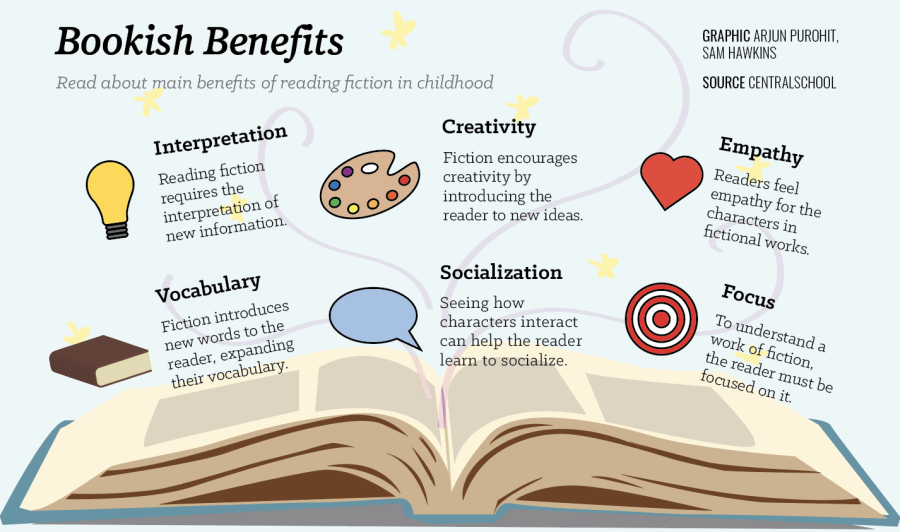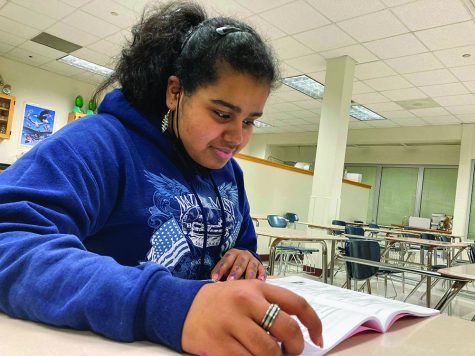Fact in Fiction
Reading fiction is senior Ella Joliet’s most favorite and frequent pastime.
“Most of the time, I read for personal entertainment to distract myself from my current life,” Joliet said. “I also read fiction to learn about new things; a lot of it is now incorporating a lot about other cultures.”
But the extensive time she spends reading is not isolated to her home setting. She said she also reads a lot of literature in school. In fact, Joliet said she has taken AP Literature and AP Language Arts and Composition, both of which require reading copious amounts of texts in their curriculum. Unlike reading at home, however, Joliet said her experience reading for school is vastly different.
“I don’t like reading as much when it comes to school curriculum,” she said. “I definitely feel more obligation whenever I have to read for school. I could enjoy books way more if I read it on my own behalf.”
English teachers are not blind to this phenomenon. English teacher Roya Farrow said she recognizes this challenge when it comes to teaching fiction and other literary works in school.
“(In our curriculum) we have left behind the value of fiction as entertainment, “ she said. “No student wants to be bored in class, and fiction is meant to entertain.”
Despite these obstacles, Farrow said she strongly believes the incorporation of fiction in school curriculum is necessary and beneficial.
“Fiction is most beautiful and impactful because it teaches us to understand people in situations that we may never interact with in real life,” Farrow said. “Fiction does this most impactfully compared to non-fiction works because if it’s well-done, we get sucked into the story and learn all of this without knowing. Learning fiction from an academic setting is of particular importance because without it, many would miss out on a lot of fiction that they wouldn’t have read otherwise. It’s also the only setting where you can sit down and discuss, which is so helpful in understanding literature.”
Joliet said she can relate to sticking to one genre and claims the exposure to new content is one of the primary benefits she’s gotten from reading fiction in school.
“I definitely gravitate towards some genres more than others. I don’t like mystery or horror, but I love realistic fiction, fantasy or romance. The upside to classes like AP Literature where we read fictitious works is exposing me to new content. Like, we read Frankenstein and it was definitely something I’d want to read again that I wouldn’t have read without it being enforced,” she said.
Senior Jillian Escobar said she agreed. For her, she said the wide variety of fiction texts that grapple themes applicable to reality is why it’s necessary to include them in the school curriculum.
“These texts I find to be a more effective commentary on society in general, and that type of change in perspective is something I wholeheartedly appreciate,” Escobar said. “When something is well-written such that a powerful and meaningful message is achieved, that’s when I really begin to understand why we teach literature in the first place.”
Farrow said broadening one’s views and applying a text’s themes into one’s real life is her ultimate goal as a teacher.
“I hope my students can become better readers by learning to understand more literal meanings and the different textual nuances. The more you read anything, the better your reading comprehension will be, and with it, you’ll learn the ability to look at something that’s creative and artistic and see how it’s a reflection of history, culture, and themselves so they can apply it to their real lives.”
Contrary to the many benefits it offers, Farrow said teaching fiction comes with some challenges other than disengagement.
“It can be challenging for the teacher because as much as you want to expose people to a bunch of content, you only have so much time,” Farrow said. “I think from a student’s perspective, the main challenge is that it can be uncomfortable to read and even more so to talk about it. You have to be aware of other people’s emotions and the reasons why they might struggle with a story, but you also want to dig into it.”
Escobar said she has had her own negative experiences reading fiction in school because of the themes it’s tackled.
“I’ve had experiences in both the fiction and nonfiction texts in our school curriculum that left much to be desired; some pieces I found to be downright insulting,” she said.
Because of her negative experiences, Escobar said she hopes the school district will choose texts that more clearly reflect themes applicable to modern society.
“The themes of Great Expectations are not the most relevant to modern society today, making it impossible to have meaningful discussion about the deeper message the author is trying to convey,” Escobar said. “I’ve much preferred The Nickel Boys, which deals directly with the issues of race, segregation and injustice, all timeless themes. That’s the type of literature I find engaging and important and encourages the broadening of one’s horizons beyond what we could previously see.”
Ultimately, all of them said that fiction is a vital and unique resource that provides benefits nothing else can. Farrow said, “Fiction can accomplish things that other works like nonfiction cannot because it wears a mask. It’s an art form, so it’s able to cross boundaries others cannot.”






